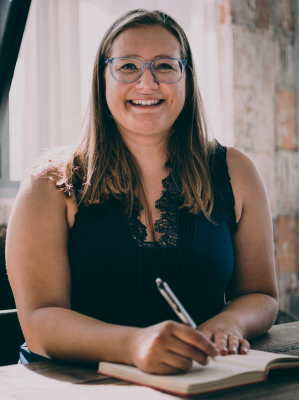When she was a special education teacher, Emilee Baker G’24 could see that the educational system was failing students with disabilities.
 To address that challenge, she decided to pursue doctoral studies in Syracuse University School of Education, supported by a Project INCLUDE grant. She will graduate this spring and, in August, she’ll pursue a new career as a postdoctoral associate and full-time researcher in the Department of Biology Teaching and Learning at the University of Minnesota Twin Cities.
To address that challenge, she decided to pursue doctoral studies in Syracuse University School of Education, supported by a Project INCLUDE grant. She will graduate this spring and, in August, she’ll pursue a new career as a postdoctoral associate and full-time researcher in the Department of Biology Teaching and Learning at the University of Minnesota Twin Cities.
It is a job Baker didn’t even believe existed, but it’s the right position at the right time, she says. She’ll join a lab that is situated in the “hard sciences” (STEM and biology), but whose faculty decided they wanted to change the way they teach those subjects. The lab group is now focused on researching and exploring approaches to teaching that are equitable, accessible, and inclusive for all students, especially for those who identify as neurodivergent, transgender, and queer, Baker says.
That’s where she came in. The lab needed a qualitative researcher as a counterpart to its quantitative focus. Since most biology lab positions involve data crunching or taking samples, Baker says she is especially excited about this unique role.
“This job aligns with all of my vast and intersecting interests—education and learning, the environment and nature, qualitative research, writing, inclusive education, instruction, social justice issues, neurodiversity, disability, and queerness,” she says.
During her time in the School of Education, Baker took advantage of many opportunities to position herself for the career she originally expected to have: assistant professor of inclusive education.
“This job aligns with all of my vast and intersecting interests—education and learning, the environment and nature, qualitative research, writing, inclusive education, instruction, social justice issues, neurodiversity, disability, and queerness.”
She researched the Bridge to the City program, a preservice teacher study away experience centering inclusive education and working with diverse students in New York City. She earned certificates of advanced study in Disability Studies and Women’s and Gender Studies. She completed the Graduate School’s Future Professoriate Program. She was a teaching assistant and a research assistant for the School of Education’s Center on Disability and Inclusion.
When the job market didn’t support her plans, Baker’s own neurodivergent behavior—anxiety—set in, she says. During the job-hunting process, “I was freaking out. People kept telling me I’d find the right position, though I was getting nervous. But I did end up finding what seemingly is going to be a perfect position for me.”
Summer Camp
Baker’s research for her dissertation—“Inclusive Environmental Education: Learning in Relation for Disabled, Genderqueer Youth”—bridges the gap between environmental and inclusive education and centers the voices of multiply marginalized youth learning in nature. As she searched for an environmental context for her work, she found it in a setting that perfectly aligned with her interests: a rare summer camp for queer and disabled students and students of color.
There, Baker was at ease with the students, and they shared a sense of comfort with her, in part because she divulged her own neurodivergent tendencies, she says. “I really understood and wanted to understand these kids and listen to them, and they sensed that, so they very much gravitated towards me,” she says.
The camp provided the kids with a vastly different learning experience than their typical school settings. “It was outdoors, away from families, school, and support systems. The students were going through a lot personally, but they were still able to focus and learn in that inclusive and healing space, and that difference was transformative for them,” Baker says.
Formal Training
Baker says her highly interdisciplinary background, qualitative research experience and research with multiply marginalized students across K-12 and higher education earned her the spot in the biology lab. Associate Professor Sarah Eddy, who runs the lab, says she appreciates Baker’s formal training in education and her depth of knowledge. “What I have valued is the depth of knowledge graduates have developed, through their education Ph.D., in quantitative methods, qualitative methods, and/or both educational theory and also critical theories. I appreciate how my projects are stronger when I partner with colleagues with formal training,” Eddy says.
Though Baker is still analyzing her dissertation findings, she hopes her research will lead to the questioning of arbitrary disability labels now used within K-12 schools, provide critical connections to schooling that takes place outside of formal education settings, and reveal deeper meaning behind kids’ learning in relation to nature and STEM education, she says.
And while she’ll be conducting her lab projects remotely, Baker is satisfied that she won’t be working alone. Having new counterparts in a setting where she’s looked to for her unique strengths, skills, and characteristics is exciting, she says.
“You can’t do research alone, let alone good research, and the most impactful experiences I’ve had at Syracuse are in lab spaces and collective groups. Being able to focus on a research agenda will allow me to feel comfortable and content about the work I’m doing instead of feeling the ‘mad dash’ to do it all,” she says. “This is allowing me to dip my foot in to see if academia is still the world I want to be a part of, and it seems like this role will support whatever avenue I want to take.”
